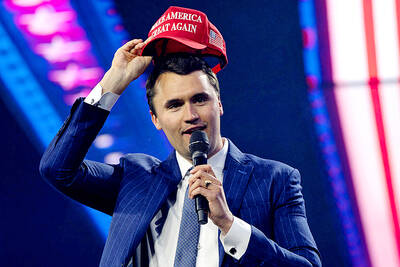Australia’s National Party has split from its conservative coalition partner of more than 60 years, the Liberal Party, citing policy differences over renewable energy and after a resounding loss at a national election this month.
“Its time to have a break,” Nationals leader David Littleproud told reporters yesterday.
The split shows the pressure on Australia’s conservative parties after Prime Minister Anthony Albanese’s center-left Labor party won a historic second term in the May 3 election, powered by a voter backlash against US President Donald Trump’s policies.

Photo: EPA-EFE
Under the long-standing partnership in state and federal politics, the Liberal and National coalition had shared power in governments, with the Nationals broadly representing the interests of rural communities and the Liberals contesting city seats.
“We will not be re-entering a coalition agreement with the Liberal Party after this election,” Littleproud said, citing policy differences.
Liberal Party leader Sussan Ley, who was installed in the role last week, had pledged to revisit all policies in the wake of the election loss. Yesterday she said she was disappointed with the Nationals decision, which came after they had sought specific commitments.
“As the largest non-government political party, the Liberals will form the official opposition,” she added.
The Liberals were reduced to 28 out of 150 seats in the House of Representatives, its worst result, as Labor increased its tally to 94 from 77, registering its largest-ever majority in an Australian election. The National Party retained 15 seats.
The Liberal Party lost key city seats to independents supporting gender equality and action on climate change.
Ley, a former outback pilot with three finance degrees, was elected as the party’s first woman leader after opposition leader Peter Dutton lost his seat in the election.
“She is a leader that needs to rebuild the Liberal party, they are going on a journey of rediscovery and this will provide them the opportunity to do that,” Littleproud said.
The Nationals remain committed to “having the door open” for more coalition talks before the next election, but would uphold the interests of rural Australians, he said.
The Nationals had failed to gain a commitment from Ley that her party would continue a policy taken to the election supporting the introduction of nuclear power, and also wanted a crackdown on the market power of Australia’s large supermarkets, and better telecommunications in the outback.
Australia has the world’s largest uranium reserves, but bans nuclear energy.
Littleproud said nuclear power was needed because Australia’s move away from coal to “renewables only” under the Labor government was not reliable.
Wind farm turbines “are tearing up our landscape, they are tearing up your food security”, he said.
Michael Guerin, chief executive of AgForce, representing farmers in Queensland state, said the urban-rural divide was worsening.
“Perhaps we’re seeing that in the political forum,” he said, adding that the Liberals and Nationals each needed to rebuild.
Treasurer Jim Chalmers of the Labor party said the split in the opposition was a “nuclear meltdown,” and the Liberals would have a presence “barely bigger” than the cross-bench of 12 independents and minor parties when parliament sits.

‘HYANGDO’: A South Korean lawmaker said there was no credible evidence to support rumors that Kim Jong-un has a son with a disability or who is studying abroad South Korea’s spy agency yesterday said that North Korean leader Kim Jong-un’s daughter, Kim Ju-ae, who last week accompanied him on a high-profile visit to Beijing, is understood to be his recognized successor. The teenager drew global attention when she made her first official overseas trip with her father, as he met with Chinese President Xi Jinping (習近平) and Russian President Vladimir Putin. Analysts have long seen her as Kim’s likely successor, although some have suggested she has an older brother who is being secretly groomed as the next leader. The South Korean National Intelligence Service (NIS) “assesses that she [Kim Ju-ae]

In the week before his fatal shooting, right-wing US political activist Charlie Kirk cheered the boom of conservative young men in South Korea and warned about a “globalist menace” in Tokyo on his first speaking tour of Asia. Kirk, 31, who helped amplify US President Donald Trump’s agenda to young voters with often inflammatory rhetoric focused on issues such as gender and immigration, was shot in the neck on Wednesday at a speaking event at a Utah university. In Seoul on Friday last week, he spoke about how he “brought Trump to victory,” while addressing Build Up Korea 2025, a conservative conference

DEADLOCK: Putin has vowed to continue fighting unless Ukraine cedes more land, while talks have been paused with no immediate results expected, the Kremlin said Russia on Friday said that peace talks with Kyiv were on “pause” as Ukrainian President Volodymyr Zelenskiy warned that Russian President Vladimir Putin still wanted to capture the whole of Ukraine. Meanwhile, US President Donald Trump said that he was running out of patience with Putin, and the NATO alliance said it would bolster its eastern front after Russian drones were shot down in Polish airspace this week. The latest blow to faltering diplomacy came as Russia’s army staged major military drills with its key ally Belarus. Despite Trump forcing the warring sides to hold direct talks and hosting Putin in Alaska, there

North Korea has executed people for watching or distributing foreign television shows, including popular South Korean dramas, as part of an intensifying crackdown on personal freedoms, a UN human rights report said on Friday. Surveillance has grown more pervasive since 2014 with the help of new technologies, while punishments have become harsher — including the introduction of the death penalty for offences such as sharing foreign TV dramas, the report said. The curbs make North Korea the most restrictive country in the world, said the 14-page UN report, which was based on interviews with more than 300 witnesses and victims who had